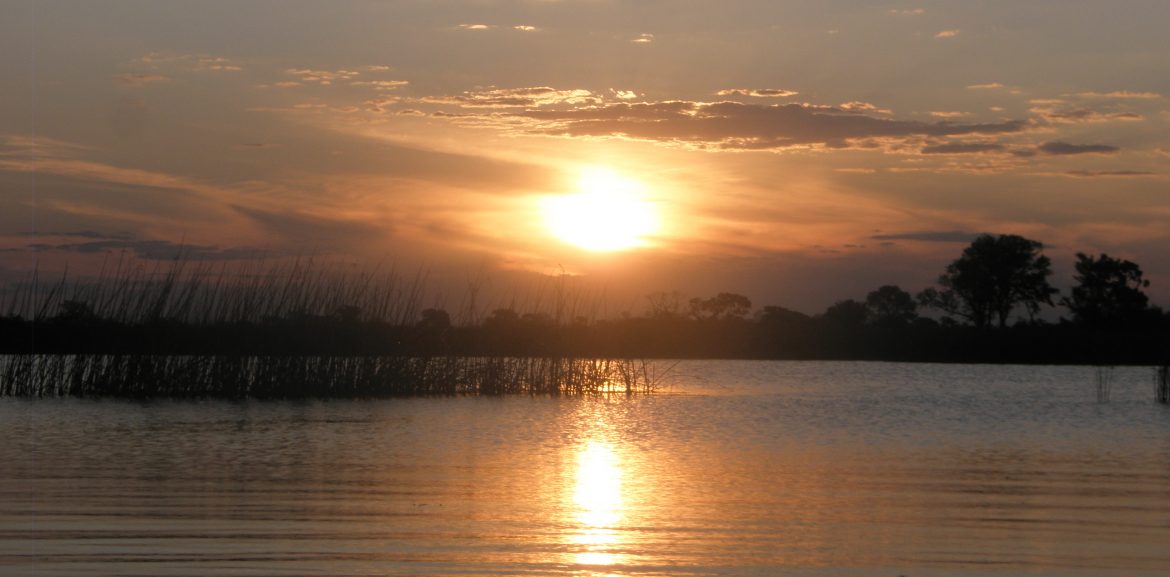Camping out in the Okavango Delta
While traveling in Botswana, I took a 3-day/2-night trip out into the Okavango Delta. A literal oasis in the middle of the sprawling Kalahari Desert, the waterways and islands of the Delta are home to some of the most breath-taking and awe-inspiring scenery in all of Africa- both in landscapes as well as wildlife viewing opportunities. Having seen numerous documentaries showcasing the Delta, I knew from the very beginning of planning my trip that this was one part of Africa I was not missing out on, no matter what, so when the time came to sign up for the trip, my name was at the top of the list.
Shortly after we pulled into the dusty town of Maun, we gathered around for a meeting that would outline the next 3 days in the Delta. Our ‘Delta Guide’ gave us the run-down of the trip- a long makoro (Traditional dugout canoe) ride out into the Delta, bush camping for 2 nights, game walks and other makoro cruises during the days, a visit to a swimming hole or two, and the amazing experience of camping out under the stars in the Okavango Delta. Needless to say, by the end of the meeting, we were ready to head out right away. We packed our smaller day-packs and food for the trip, and then tried to find ways to while away the time until our departure the next morning.
We were up early the next morning to board the trucks for the transfer from the campsite to the Delta’s edge. It was a cool morning, and the trucks were open-air, so we had long-sleeves and wind-breakers on to keep us warm until the sun rose a bit higher. It was an hour’s drive through rural farmland from Maun out to the Delta put-in, and we noticed the terrain continually getting greener and greener the closer we got to our destination. Finally, we pulled to a stop on the side of what seemed to be a large lagoon.
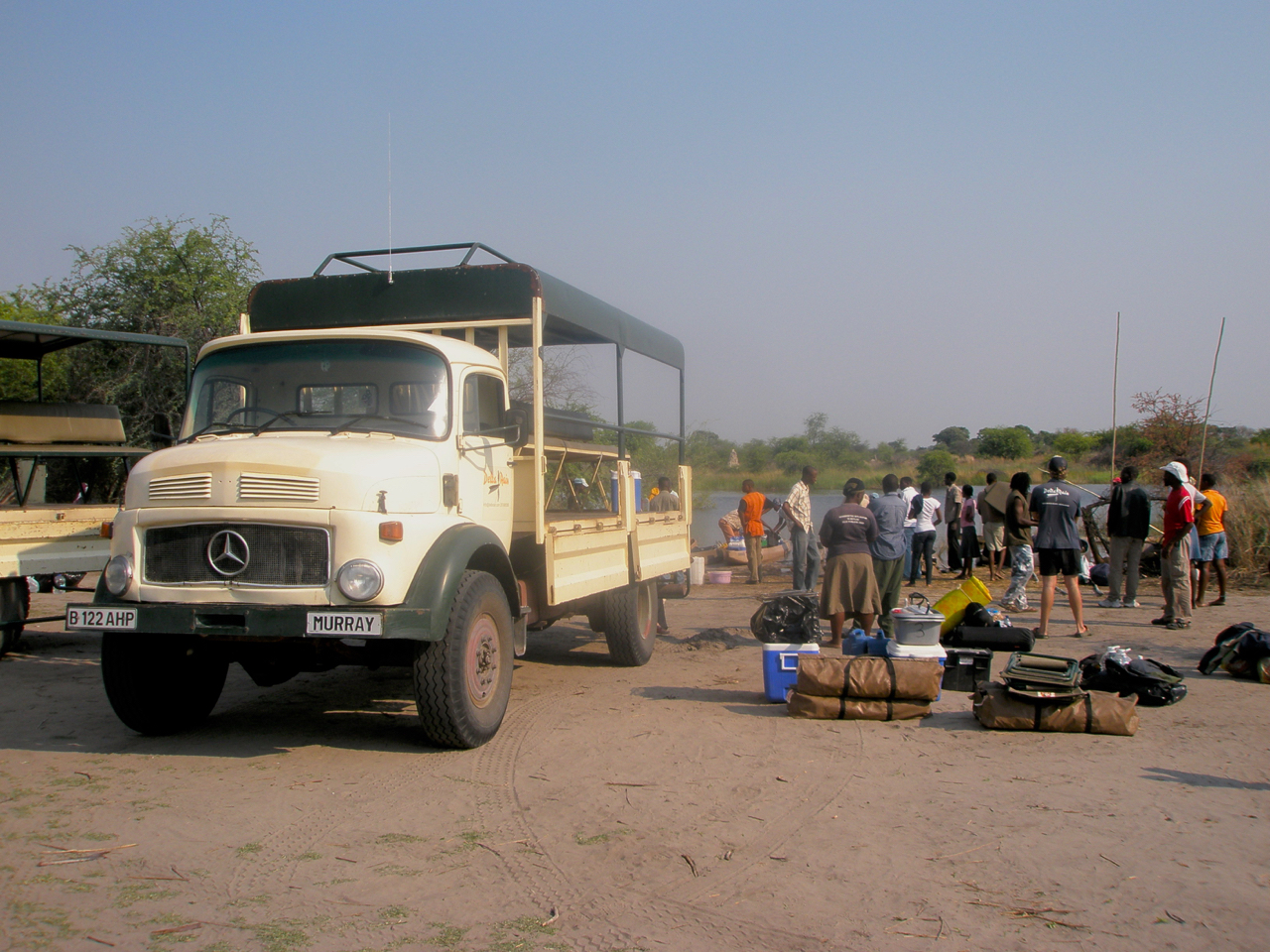
Getting gear sorted for our trip into the Okavango Delta...
We all hopped off the truck and unloaded our gear while trying to stay out of the way of the many locals that were bustling around getting things prepared for the trip- I was amazed at how many people were involved. There were several makoros lined up along the water’s edge, and all of the locals were busy loading them with water and food, firewood and cooking equipment. We were told where to place our belongings, and shortly those were loaded into the makoros as well. We were introduced to the local guides that would be navigating us through the innumerable waterways of the delta and out to our camp sites. Finally, we gingerly settled into our makoros- 2 per boat, plus a guide- bags, sun cream, snack sacks, and water positioned around us as comfortably as possible. We had been told that it was going to be about a 3 hour trip out into the delta, and that we weren’t going to be able to move around very much in the narrow and seemingly all-too-unstable canoes. Sun hat on and SPF 50 applied, we pushed off, and our adventure was underway.

A leisurely makoro ride into the delta...
The Okavango Delta is an amazing place- cool clear waters flowing through tall grasses, islands spotted with palm and acacia trees, and abundant wildlife throughout. It is the world’s largest inland delta, the result of the seasonal flooding of the Okavango River system emptying itself into the basin of the Kalahari Desert. Because of the surrounding desert, the delta is an oasis for local plant and animal life, and is one of the most unique ecosystems in the world. Prides of lions patrol the islands, in search of herds of zebra, wildebeest, and water buffalo. Giraffe and elephants keep watch for predators like leopards and cheetahs, while shy rhinos and the ever-elusive wild dogs keep a low profile. Nile crocodiles and hippopotamus make their homes in the waterways, while fish eagles and cranes soar overhead in search of food. The water supply supports an incredible amount of life, and the residents of the delta have it pretty easy compared to their relatives in other, drier parts of the African wilderness.
Our trip into the Delta was great- once we got the delicate balance of riding in the unstable makoro down. As our guide poled us along, I was surprised to see that most of the delta is no more than shoulder deep- the water was so clear, we could see the bottom of the narrow canals we were passing through, and our guide had no problem using the long pole to keep up slowly moving along. It started to get hot, and with no shade to be had, I felt like any exposed skin was getting roasted, regardless of how much sun cream I lathered on them. I noticed the locals simply dipping their cups into the water as we glided along, pouring some waster on their head and then drinking the rest, straight from the delta. Apparently, the water was safe to drink- for the locals, at least- but I decided it was still a good idea to drink bottled water. Better safe than sorry.
We continued along in this way for a long time- slowly gliding along through narrow pathways in a seemingly unending prairie of marsh grass. The gentle splash of our guide’s pole in the water, the rhythmic speeding up and slowing down of the makoro, the gentle breeze blowing across the open boat- I dozed off for awhile, despite my back and legs slowly growing numb from being in the same position for so long. Finally, our guide settled the nose of our makoro into the mud at the side of a small island, and we had arrived at our campsite. I slowly stood up, gingerly straightening out and stepping out of the front of the canoe and onto dry land. After a quick stretch, we unloaded all the gear- tents, sleeping bags and mats, pots and pans, containers full of food and utensils, several bottles of water, firewood, and last but not least- a shovel to dig our ‘bush toilet’- all that packed into in our three little makoros. It was amazing.

Our campsite in the delta....
First, we set to the task of pitching our tents and organizing our campsite. We all noticed the piles of dried elephant droppings all around the place, and the guides were quick to tell us that it wasn’t uncommon for elephants to visit campsites at night in search of food that had been left out. We all made a mental note to make sure EVERYTHING was put away in the kitchen tent before we went to bed at night. I mean, I love elephants and everything, but I don’t really want them stomping around my tent in the middle of the night- it had happened before, and I found it to be just a bit disconcerting… After we got our tents set up, the fire pit dug, and the ‘toilet’ sorted, it was time to set out on our first game walk in the delta.
Now, I had been on game walks before, and called myself crazy afterwards for putting myself in such a precarious position. A ‘game walk’ is exactly what it sounds like- a walk through the wild in search of game. Who knows what you may encounter? In Nepal, it had been stealthy tigers and grazing rhinos. In the Okavango Delta, there were any number of dangerous animals we could come across- prowling lions, leopards and cheetahs; hyenas and crocodiles lying in wait; herds of edgy water buffalo and overprotective hippos scattered about. Throw in a few thousand elephants and some wary rhinos, and the potential dangers were everywhere. So, knowing all of this was out there waiting, and we wanted to just walk right into it, on foot, with no protection- no vehicle, no guns, nothing at all with which to stop a charging lioness or an upset buffalo. Smart? Probably not… But, that’s just part of it- all part of the experience, so to speak…
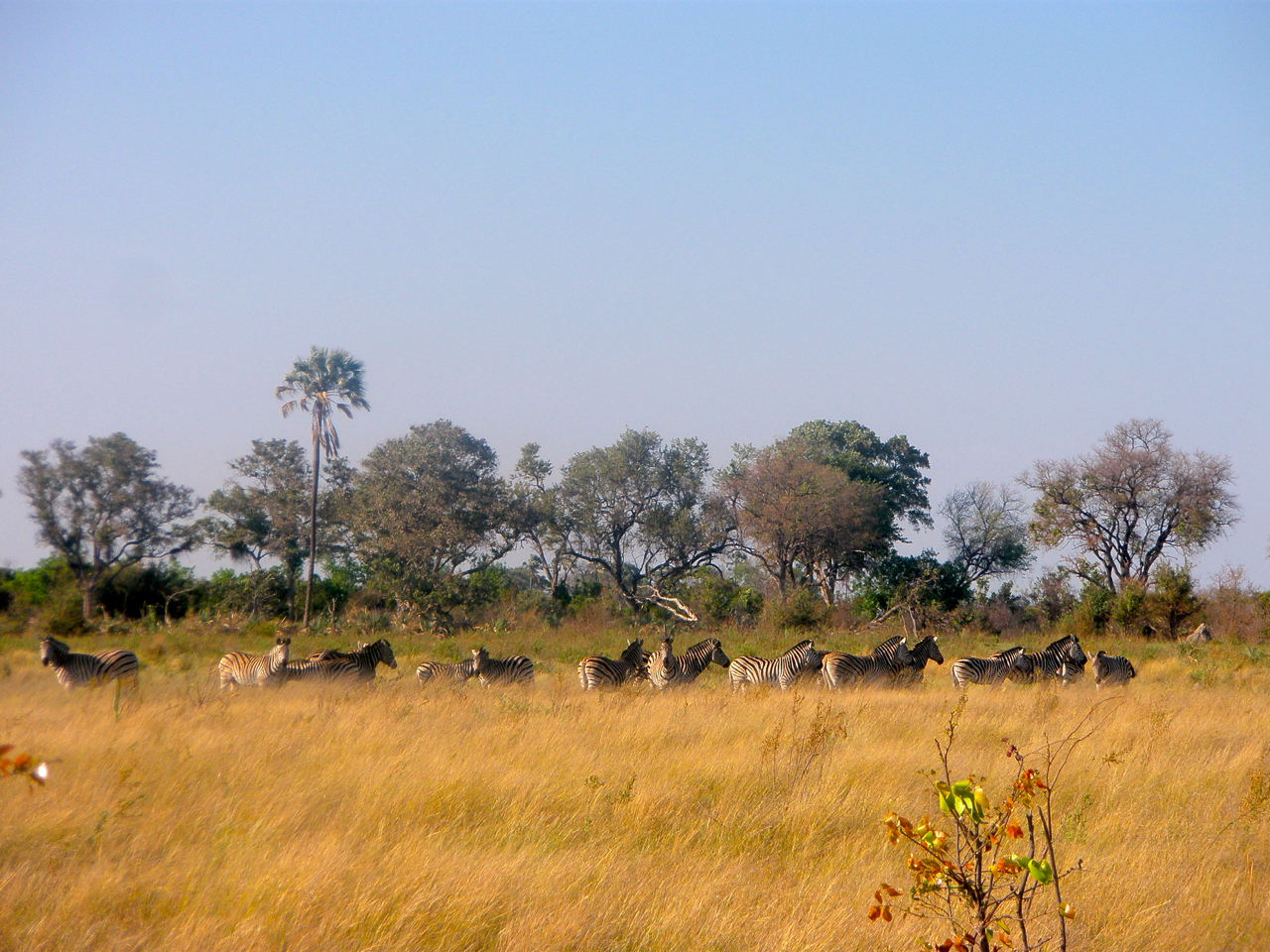
Herd of zebra in the delta...
Anyway, our bush walks turned out to be pretty uneventful- we didn’t encounter anything dangerous, and the only wildlife we saw was a herd of zebra, and even then at a pretty good distance away. We did come across several skeletons- giraffe, hippo, buffalo, etc.- but that was the only evidence we saw of any predators possibly having been in the area. Still, it was amazing to be out and walking around the islands of the delta- it was beautiful. Stands of trees rising tall over golden grasses, dusty game trails meandering across the sun-baked fields, rocky outcroppings spotted here and there providing a great vantage over the surrounding area. It was a really cool walk, despite the lack of ‘action’.
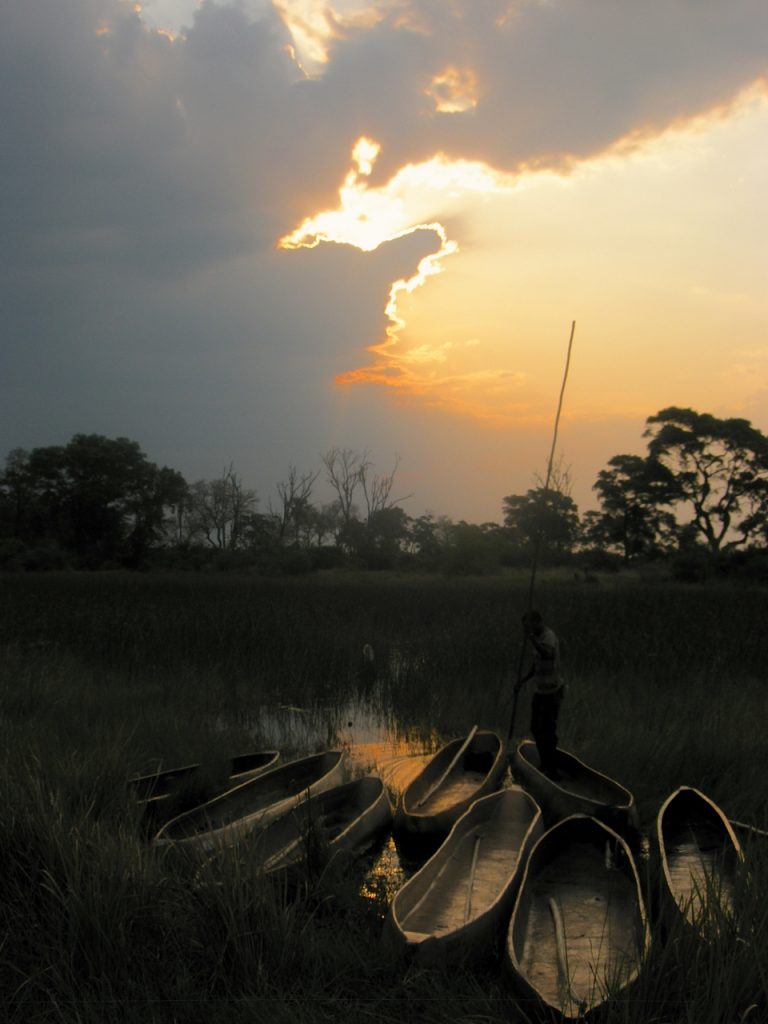
Beautiful skies in the delta...
The rest of our time in the delta went much the same- we went on a couple more walks, never encountering anything too exciting. We did come across a lone bull elephant on one of our twilight makoro cruises. He turned and studied us, gave a great bellow, and then rumbled away, disappearing into the underbrush. We found a swimming hole the second afternoon, and each had a go at poling the makoros around. It quickly became obvious that one had to have grown up in the delta to be able to navigate it in the traditional boats, and we all had a laugh as we toppled over the side and into the water. We saw some AMAZING sunsets over the delta, enjoying the peace and tranquility of being in the middle of the Botswana wilderness with nothing around to spoil it. At night, were were serenaded by the trumpeting of elephants and the calls of night hawks while sitting around the fire, roasting marshmallows and gazing up at the stars. Sure, we were ‘roughing it’, but to be honest, it was so peaceful that we hardly noticed that we hadn’t showered in 3 days, or that we had to cover the ‘toilet’ with fresh dirt after each use. Despite the lack of wildlife-related ‘excitement’ on our trip into the delta, when the time came to pack up the tents and load the makoros for the trip back to civilization, I wished we had more time to enjoy it.
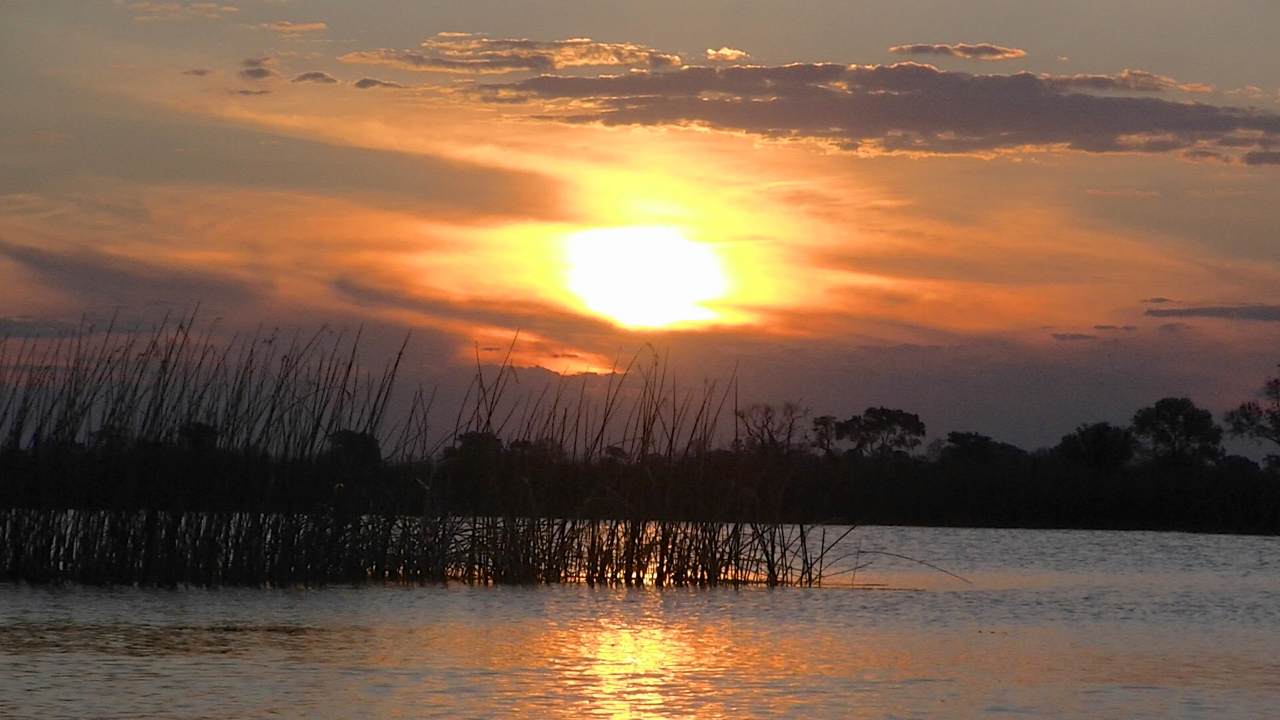
Sunset over the Okavango Delta
To start planning YOUR adventure through Botswana, click HERE......

